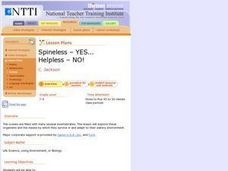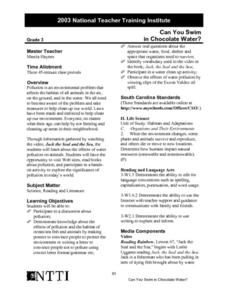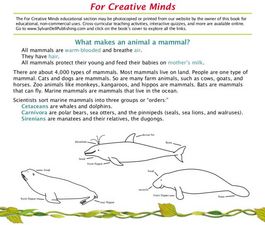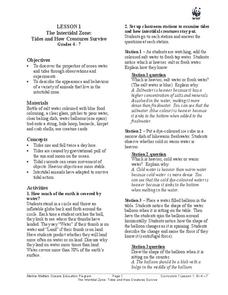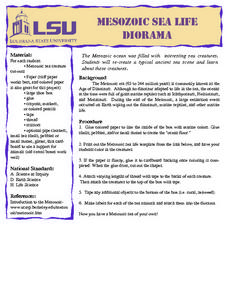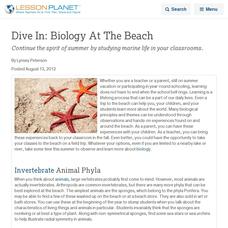Curated OER
Spineless - YES... Helpless - NO!
Students distinguish between invertebrate and vertebrate organisms while examining the zoological classes of a number of invertebrates. They illustrate a food web of these organisms and investigate the impact of humans on the oceanic...
Curated OER
Galapagos: Beyond Darwin
Young scholars identify plants and animals endemic in their local area after learning about the plants and animals of the Galapagos Islands. In this plants and animals lesson plan, students create an endemic garden on school grounds.
Curated OER
Can You Swim in Chocolate Water?
Third graders discss water pollution and its affects on animals. They watch a demonstration using a plastic fish in a fish bowl in which various types of water pollution are illustrated.
Curated OER
For Creative Minds: What Makes an Animal a Mammal?
Students read about categories of mammals and their features. Students then construct a marine animal, using given print outs in the lesson. Students then create adaptations for their mammal, using a web site reference for guidance.
Curated OER
Creatures of the Sea
Fourth graders complete a two-month long unit on the physical characteristics of the oceans and animal environments. They create a "Creatures of the Sea" alphabet book in collaboration with a kindergarten class, conduct Internet...
Curated OER
Life on the Surface of the Earth
Young scholars discover that life occurs on or near the surface of the Earth in land, air, and water. They read the literature selection, 'Whose Forest Is It?'
and discuss with students that there are examples of of many living...
Curated OER
El Nino and Its Effects
Students research El Nino and its effects all over North America using Web Resources. Working in teams, they present their findings. They look for connections and relationships between animal behavior and climate.
Curated OER
The Intertidal Zone: Tides and How Creatures Survive
Young scholars study the properties of ocean water and tides and learn about animals that live in intertidal zones. In this intertidal zone instructional activity, students participate in classroom stations to learn about fresh water and...
Curated OER
Coral Reef Choreographic ProjectTo
Students enhance their understanding of how animals function in a habitat.Students are scattered individually and in small groups. About half of students make coral shapes in small groups. The other half of students move like animals in...
Curated OER
All That Glitters...
Learners study that white light (visible light) is comprised of all colors of the spectrum. They study that the quantity of light decreases with increasing depth in the ocean. They study that the quality of light changes with increasing...
Curated OER
Mesozoic Sea Life Diorama
Students create a diorama depicting Mesozoic sea life. They color a template and add shells and pebbles to the diorama to depict the ocean floor.
Curated OER
Echo Location
Students participate in a role-playing activity that demonstrates how whales use sound as an adaptation to their environment.
Curated OER
Marine Communities
Students view a video and then complete lab exercises to help them explain marine communities and animals in them.
Curated OER
Lights in the Deep
Students describe, compare, and contrast bioluminescence, fluorescence, phosphorescence, and chemiluminescence. They explain the role of three major components of bioluminescent systems. They ex
Curated OER
Discovering the Oasis
Students focus on the types of vegetation and animal life living around local water sources. This lesson can be adapted to any local water source, whether it be a lake, a river, stream or ocean. It has a particular focus on the bird...
Curated OER
Learning About Mammals
Students study the mammal classification and forms of them living in the United States. For this mammal study lesson, students read through orders of mammals that exist in the United States. Students also study the taxonomy of an eastern...
Discovery Education
Sonar & Echolocation
A well-designed, comprehensive, and attractive slide show supports direct instruction on how sonar and echolocation work. Contained within the slides are links to interactive websites and instructions for using apps on a mobile device to...
Curated OER
Ecosystems and Remote Sensing
Students obtain remote sensing data to compare and contrast global biomass data with global temperature data.
Curated OER
Dive In: Biology At The Beach
Continue the spirit of summer by studying marine life in your classrooms.
American Museum of Natural History
What's the Big Deal About Water?
It may seem simple, but water is one of the most unique substances on Earth. An interactive online lesson describes its properties and importance in so many different situations. Learners interact with the lesson to learn the role water...
K12 Reader
Eastern Woodland Natives
Supplement your social studies instruction with a reading passage about the Eastern Woodlands. After reading the passage, learners respond to five related questions.
Curated OER
Penguins Around the World
Students investigate penguins. In this Science instructional activity, students compare and contrast penguins to flying birds. Students use a Venn diagram to illustrate the differences and similarities of penguins and flying birds.
Curated OER
Geometry: Practical Applications of the Distance Formula
Pupils, working independently and in groups, apply the distance formula to practical situations. After solving various problems, students in pairs design coordinate planes from the school blue print to measure the distance from the...
Curated OER
Habitats
Students examine how different living things interact with their environment. As a class, they discuss the characteristics of a habitat and write the list on the board. In groups, they focus on one habitat and create a mural of the...


